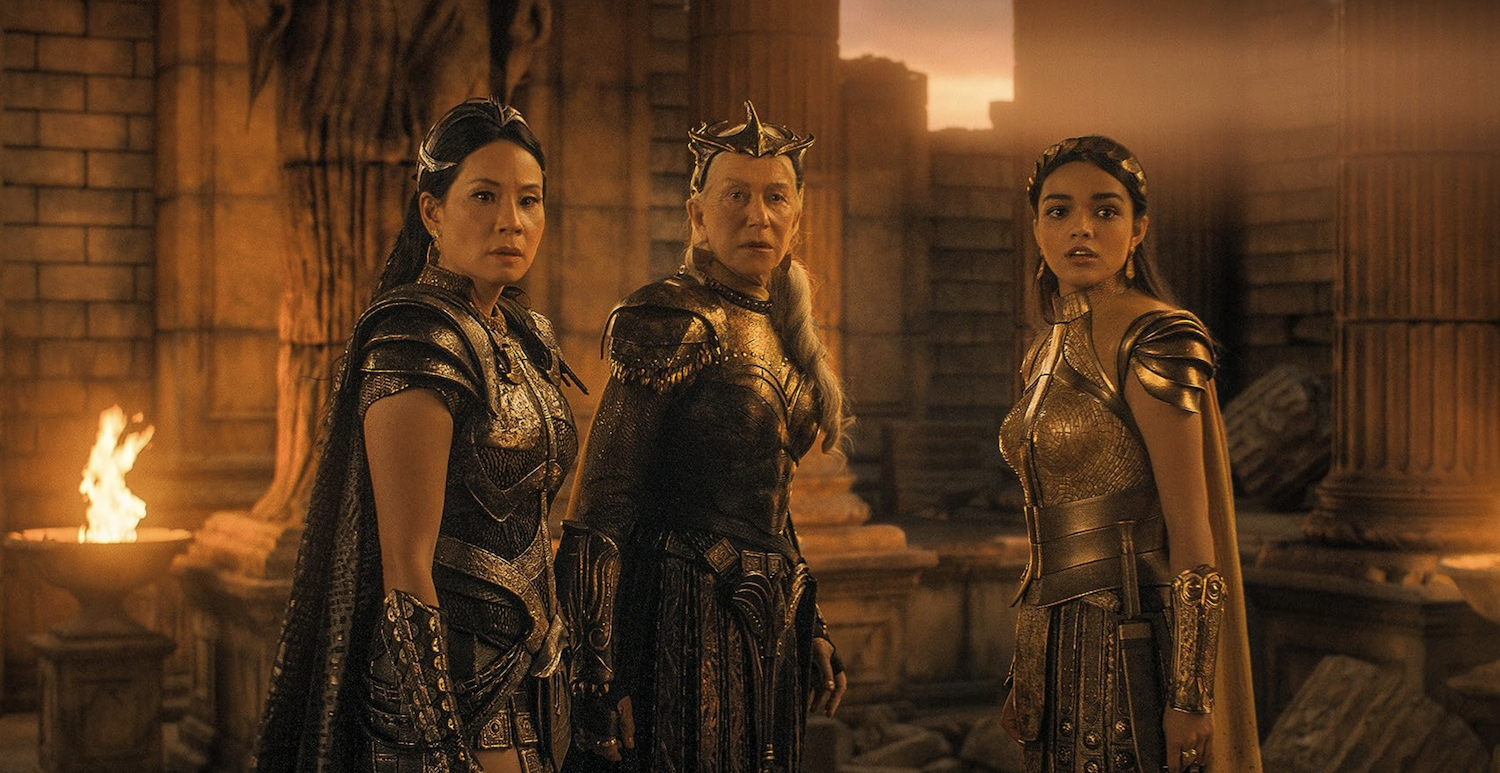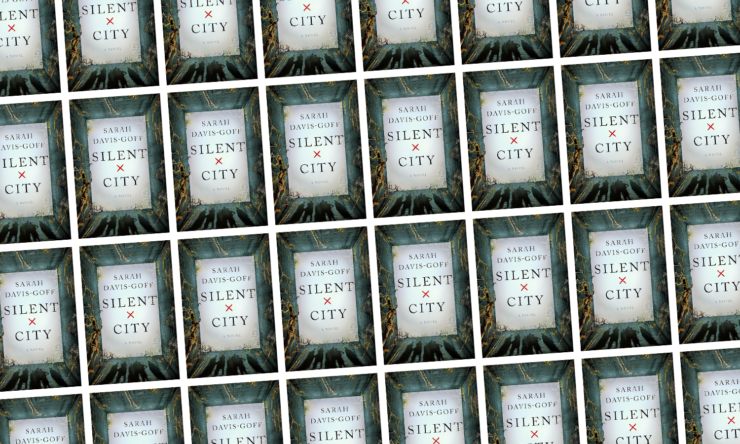There are things that Sarah Davis-Goff’s Silent City does excellently well. And yet, on the whole, my response is one of ambivalence. It’s left me with a quiet sense of dissatisfaction at how it structures its meditations on dystopia, on isolation and belonging, violence and complicity, power and loneliness, that I’m still not entirely sure whether the difficulty lies with me as a reader or with how the novel goes about what it’s trying to convey.
Part of the problem may well be that this could be only the middle movement of a trilogy. Though nowhere in the novel’s cover copy suggests it, the conclusion leaves room for continuation. And what also goes unmarked, such that I didn’t realise until well after I’d finished reading it, is that Silent City is a sequel to Davis-Goff’s 2019 debut (which I missed reading), Last Ones Left Alive. The narrative arc stands alone so well I would not have thought to look for a different beginning. But its themes, its arguments, what Silent City has to say about the world and about people, that’s what feels incomplete to me, and perhaps this is because I’ve only seen half the picture.
Silent City is a zombie novel. But it takes the starting point of zombies—a world overrun, a postapocalypse in which civilisation clings on in a single fragile settlement—and uses it as the frame for dystopia. Unlike many American-set zombie stories, this isn’t a survival adventure, and unlike the British-set ones with which I’m most familiar (given their best expression in M.R. Carey’s The Girl with All The Gifts) it isn’t leaning in to survival horror with an ecological bent, either. That makes sense, because Davis-Goff sets her novel in Ireland, an Ireland completely—or very nearly—depopulated by the skrake. All that remains are the dead, the skrake (recognisable in the zombie taxonomy of nearly-mindless formerly-human killing animals whose bite transforms the bitten, called “skrake” for the sound they make), and Phoenix City—the site of our dystopian remnant settlement.
Orpen is Silent City’s narrator. Raised alone on an island by two women who are both dead before the novel begins, she would be painfully isolated had she not encountered the “banshees,” the women who are Phoenix City’s scouts and enforcers. The circumstances of that encounter sees her with a place in Phoenix City as one of them, scavenging the carcass of Dublin’s urban sprawl for the picked-over remains and enforcing the brutal dictates of Phoenix City’s so-called “management” on those who live within the constantly-rebuilt wall-and-ditch that both protects and traps its inhabitants. A rigid social hierarchy divides the city: who gets comfort, who gets to eat, and who gets to work while starving. Noise attracts the skrake. This is the rationale for why unnecessary speech is forbidden, but it’s a literal silencing of dissent that works to prevent solidarity arising between those who are differently subjected under the management, between banshees, “breeders”, workers, farmers, “wallers” (who work on the wall), and the starving inhabitants of the shanties. Dissent is treason. Even talking about striking out alone and leaving the city behind is treason, and treason is punished by death: beaten, gutted, and thrown to the skrake.
Buy the Book


Silent City
What struck me most and strikes me still about Orpen’s voice in Silent City is how it speaks in the register of my neighbours. Davis-Goff’s choice of words, the rhythm of Silent City’s language, have the everyday familiarity of spoken Hiberno-English, and familiar, too, is Orpen’s weariness with isolation, her exhaustion with being alone, her desire to have instructions to follow and some place to, if not belong, at least be in company, to have someone else to make choices—not all her choices, not forever, but surely she can let someone else direct her just for a while, just for a rest? The close-knit company of a banshee troop offers her companionship, and Agata, her assigned banshee partner, is someone she trusts deeply, even loves.
Phoenix City never betrays Orpen’s trust, because she would have had to have trusted it to start with for that to be true. It’s not that she doesn’t know what she’s doing, or how the management views most of the people within the city’s walls. It’s not that she lacks empathy, or a sense that there ought to be a better way. But her own comfort, her desire to belong, and the strong negative incentives for speaking out, taking action, trying to leave or actually leaving, are countervailing pressures; she doesn’t know if anyone else feels the way she does, after all, because anyone could turn you in to the management. (The desire for someone else to take responsibility, wanting to belong more than wanting to be ethical, that’s often how ordinary people do terrible things, while fear of informers is how authoritarian states keep ordinary people from working for change.) It’s not until the leaders of Orpen’s troop take their small squad out on an unsanctioned overnight mission to scavenge the overgrown ruins of Dublin Airport (atmospherically described, a bewildering blocked-up wilderness of the terminal buildings filled with peril) and run into the kind of trouble that gets their youngest, newest member—a barely teenaged adolescent, one of the many who join the banshees too young and too untrained and rapidly die—torn apart by the skrake, that Orpen begins to understand that she’s not alone in wanting to leave. Orpen didn’t learn from childhood how to be social, how to exist among many other people; this is the first time she’s realised she represents the potential for a life outside of Phoenix City and its authoritarian constraints to the women closest to her, and maybe to more than them.
It’s Agata who’s betrayed Orpen’s trust, told the others all the secrets about her history that Orpen confided in her. Orpen thought she knew Agata, that Agata felt as close to her as she did to Agata, but she finds herself wrongfooted, mistaken. And it’s Agata who, it turns out, doesn’t just want to leave but to burn down Phoenix City in their wake.
For all their inescapable predatory danger, the skrake are Silent City’s scenery, not its monsters. As far as Silent City is concerned (as far, at least, as I can tell) the real enemy is systems of oppression and the urge to go along with them.
And yet I feel as though I have read this dystopia before, with its smiling men at the top who speak the language of P.R. and platitude while knifing scapegoats in the gut. With its portrayal of the charismatic attraction of violence in support of the system—in defence of “the city” or “your country”—when it’s really in support of one’s own status and those same smiling men. With its ambivalence about the value of violence, and whether it is worth indiscriminately killing the innocent along with the guilty to bring an oppressive system down.
The conditions of Phoenix City parallel those of a badly-run eternal refugee camp, with comfort available for some and only deprivation for others, and the management layer deciding who gets what, and who gets thrown out: a site of struggle and exploitation, with overcrowding, raw sewage, bad water, disease and poor food for those not able to play the system to their benefit. (Only instead of being sent back to whatever you’ve fled from, you’re literally thrown to your death.) The violence of the system is explicit, the perils of failing to conform, failing to demonstrate your usefulness to the arbiters of the system, given visible and exaggerated presence in the form of the skrake.
The real fantasy here is the fantasy of revenge, which plays out in ways that Orpen is first not even aware of, against responsible individuals at the top of the system: a revenge that, while earned, results in even more suffering. Silent City closes on bloody revolution and the potential for escape, literal and metaphorical, from Phoenix City’s system of oppression, but also on shocking disregard for human life in the course of revenge, an examination of how systems of oppression warp everyone who survives them.
(If this sounds like a political statement, yes, I’m pretty sure Davis-Goff is making a few—some of them about the Irish establishment.)
And Orpen, who began as an outsider, ends the novel as an outsider still.
Silent City is an atmospheric narrative, with compelling characters and deft, readable prose. Orpen is fascinating, and Davis-Goff is very good at straddling the line of the ordinary and the shocking in the banality of violence and Orpen’s half-estranged perspective. It’s also retreading some very familiar thematic ground, that of atrocity, complicity, and responsibility, though. And right now I don’t think any treatment of this theme has the power to satisfy me.
Oh, and full marks for an oppressive dystopia where many characters are queer and it’s not a major axis of angst.
For all my thematic ambivalence, I do recommend Silent City. Davis-Goff is definitely a writer to watch.
Silent City is published by Flatiron Books.
Liz Bourke is a cranky queer person who reads books. She holds a Ph.D in Classics from Trinity College, Dublin. Her first book, Sleeping With Monsters, a collection of reviews and criticism, was published in 2017 by Aqueduct Press. It was a finalist for the 2018 Locus Awards and was nominated for a 2018 Hugo Award in Best Related Work. She was a finalist for the inaugural 2020 Ignyte Critic Award, and has also been a finalist for the BSFA nonfiction award. She lives in Ireland with an insomniac toddler, her wife, and their two very put-upon cats.










